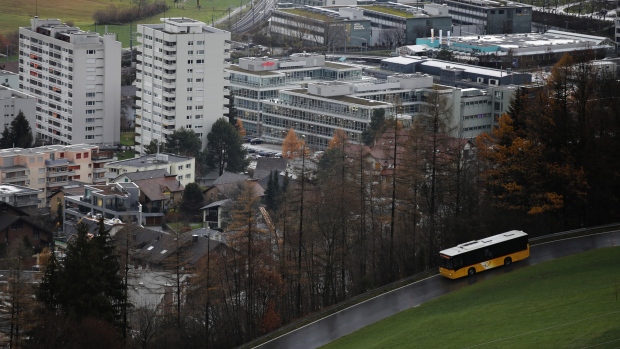Dec 6, 2018
This Swiss Village Bet on Hedge Funds and Lost
, Bloomberg News

(Bloomberg) -- As the clock ticks down toward Brexit, cities across Europe are scrambling to win jobs fleeing the City of London. In the Swiss village of Pfaeffikon—once one of the biggest global centers for hedge fund money—a potential influx of investing professionals is being met with a decided lack of enthusiasm.
The sleepy lakefront settlement of 7,000, a half-hour from Zurich, understands the perils of relying on finance as an economic engine. In the first decade of this century, Pfaeffikon prospered as its low taxes attracted global financial firms, particularly hedge funds. The population jumped, tax revenue soared, and glass-and-steel office buildings sprang up in the meadows flanking the main street.
Pfaeffikon paid the price when almost 1,000 hedge-fund-related jobs evaporated after the 2008 global economic crisis. Local officials scrambled to make up for lost taxes, landlords struggled to fill suddenly empty office space, and local restaurants wondered what happened to the lunch crowds.
“The financial-sector workers went to the butcher, to the hairdresser,” said Diego Foellmi, a longtime resident of the area and partner at Herens Quality Asset Management in Pfaeffikon. “After the funds cut jobs, these people suffered.”
Today, Pfaeffikon has largely bounced back, with finance jobs in the canton of Schwyz, where the village is located, almost 10 percent higher than their level in 2011. While a handful of hedge fund jobs have returned, the rebound has been built on a more diverse roster of companies attracted by Pfaeffikon’s transport links, fiber-optic internet connections, and dozens of new buildings. Chemical producer BASF arrived last year with 85 employees. Industrial conglomerate OC Oerlikon has been expanding and now has 150 workers there. And a management company spun off from furniture retailer Ikea has eight staffers in a location it opened in 2016.
“After the financial crisis, Pfaeffikon decided to diversify,” said Urs Durrer, who oversees economic development in the canton. “There was lots of empty office space, but that’s gotten better as non-financial companies have moved in.”
The push for a broader economic base marks a big change from two decades ago, when Pfaeffikon viewed hedge funds as key to its prosperity. A couple of companies showed up in the 1990s, attracted by the bucolic lifestyle, easy access to Switzerland’s finance capital, and—especially—the canton’s corporate tax rate of 12.5 percent, versus the 20 percent-plus in Zurich. Local leaders grew enthusiastic about the sector and promoted the area’s attractions to others in the industry.
Those efforts paid off as hedge funds Man Group and Horizon 21 grew to dominate the town’s employment rolls, with some 800 workers between them in 2008. At least a dozen smaller firms joined them in the village, adding hundreds more jobs, and in the decade after 2000, the population of the community of Freienbach, which includes Pfaeffikon, swelled by almost 20 percent.
The champagne flowed as twentysomethings in jeans closed $100 million deals. At lunch, queues for sandwiches at the butcher and baker stretched halfway down the street. Young Anglo traders and money managers could be seen kicking soccer balls around on the local fields. Their presence didn’t go unnoticed at Autohaus Wollerau, the local Ferrari and Porsche outlet. “These were people who earned big money,” said Güngör Alci, the dealership’s owner.
The party ended after markets collapsed in 2008 and 2009. Man Group cut its local workforce from 550 to 200 over about five years, and Horizon 21 shrank from 200 to just 10 employees managing the assets of founder Rainer-Marc Frey and his partners. Local officials say tax receipts plummeted, and some 50,000 square meters (540,000 square feet) of office space lay empty.
What made it sting even more, was Freienbach’s purchase of shares in a Horizon 21 fund. In June 2008, officials put 5 million francs ($5 million) of taxpayer money into one of the company’s investment vehicles—and the value quickly started dropping.
“The only solution is to sell the Horizon 21 investment,” a community group called the Buergerforum wrote on its website, “if there’s anything left.” When the town got out a year later, the stake was worth just 3.3 million francs, the group says.
These days, a somewhat chastened finance sector has started to come back to Pfaeffikon. Hedge fund Stone Milliner opened an outpost there in 2016. In September, macro fund EDL Capital abandoned offices in London’s Mayfair for digs next to Pfaeffikon’s train station. And last year, Herens Quality Asset Management moved 16 employees from across the lake. Still, while the town is happy to see almost any employer show up, it’s not exactly going out of its way to woo hedge funds like it once did.
“With Brexit, we’re seeing more requests,” said Adrian Gattiker, a property developer in Pfaeffikon. “Financial firms are thinking of moving over, mostly asking questions at this stage and checking out the costs.”
--With assistance from Nishant Kumar, Suzy Waite and Ellen Milligan.
To contact the author of this story: Patrick Winters in Zurich at pwinters3@bloomberg.net
To contact the editor responsible for this story: David Rocks at drocks1@bloomberg.net
©2018 Bloomberg L.P.





